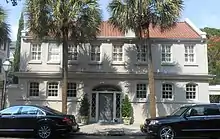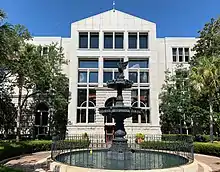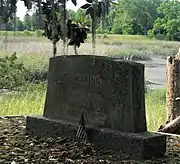Julius Waties Waring | |
|---|---|
| Senior Judge of the United States District Court for the District of South Carolina | |
| In office October 7, 1965 – January 11, 1968 | |
| Senior Judge of the United States District Court for the Eastern District of South Carolina | |
| In office February 15, 1952 – October 7, 1965 | |
| Chief Judge of the United States District Court for the Eastern District of South Carolina | |
| In office 1948–1952 | |
| Preceded by | Office established |
| Succeeded by | George Timmerman |
| Judge of the United States District Court for the Eastern District of South Carolina | |
| In office January 23, 1942 – February 15, 1952 | |
| Appointed by | Franklin D. Roosevelt |
| Preceded by | Francis Kerschner Myers |
| Succeeded by | Ashton Hilliard Williams |
| Personal details | |
| Born | July 27, 1880 Charleston, South Carolina, US |
| Died | January 11, 1968 (aged 87) New York City, US |
| Resting place | Magnolia Cemetery Charleston, South Carolina |
| Education | College of Charleston (A.B.) read law |
Julius Waties Waring (July 27, 1880 – January 11, 1968) was a United States district judge of the United States District Court for the Eastern District of South Carolina who played an important role in the early legal battles of the American Civil Rights Movement. His dissent in Briggs v. Elliott was foundational to Brown v. Board of Education.
Biography
Early life and education

Waring was born in Charleston, South Carolina,[1] to Edward Perry Waring and Anna Thomasine Waties.[2] He graduated second in his class with an Artium Baccalaureus degree from the College of Charleston in 1900.[1] Waring read law in 1901 and passed the South Carolina bar exam in 1902.[1] He married his first wife, Annie Gammel, in 1913. Their only daughter was Anne Waring Warren, who died without children. The couple moved into a house at 61 Meeting St. in 1915.[3]
Career
He was in private practice of law in Charleston from 1902 to 1942 and an Assistant United States Attorney in the Eastern District of South Carolina from 1914 to 1921.[1] He served as the city attorney for Charleston from 1933 to 1942, under Mayor Burnet R. Maybank.[3] In 1938, he served as the campaign manager for Democratic Senator Ellison D. "Cotton Ed" Smith. Waring founded a law firm with D. A. Brockington.[3]
Federal judicial service
Waring was nominated by President Franklin D. Roosevelt on December 18, 1941, to a seat on the United States District Court for the Eastern District of South Carolina vacated by Judge Francis Kerschner Myers.[1] He was confirmed by the United States Senate on January 20, 1942, and received his commission on January 23, 1942.[1] He served as Chief Judge from 1948 to 1952.[1] As Chief Judge, Waring ended segregated seating in the courtroom and chose a black bailiff, John Fleming, who quickly became known as "John the Bailiff."[4]
Judicial philosophy and move to New York
Waring had been initially supported by the establishment of Charleston.[3] After divorcing his first wife and marrying the Northern socialite Elizabeth Avery, Judge Waring quickly transitioned from a racial moderate to a proponent of radical change.[5] Speaking at a Harlem church, he proclaimed: "The cancer of segregation will never be cured by the sedative of gradualism."[5] Political, editorial, and social leaders in South Carolina criticized and shunned Judge Waring and his wife[6] to the point where, in 1952, when he assumed senior status,[1] they left Charleston altogether and moved to New York City.
Isaac Woodard case
In 1946, Chief of Police Linwood Shull of Batesburg, South Carolina, and several other officers beat Isaac Woodard, a black man on his way home after serving over three years in the army, including repeatedly striking him in the eyes, blinding him. After it became clear that the state authorities of South Carolina would take no action against Shull, President Harry S. Truman himself initiated a case, brought to the federal level on the grounds that the beating had occurred at a bus stop on federal property, and that at the time of the assault, Woodard was in uniform.
The case was presided over by Waring, but by all accounts the trial was a travesty. The local United States Attorney charged with handling the case failed to interview anyone except the bus driver, a decision that Waring believed was a gross dereliction of duty. The behavior of the defense was no better. The defense attorney at one point told the jury that "if you rule against Shull, then let this South Carolina secede again",[7] and he later shouted racial epithets at Woodard. The jury found Shull not guilty on all charges.
The failure to convict Shull was perceived as a political failure on the part of the Truman administration and Waring would later write of his disgust of the way the case was handled commenting, "I was shocked by the hypocrisy of my government...in submitting that disgraceful case..."[8]
Further race-based cases
In several other cases he ruled in favor of those who had challenged racist practices of the time:
- In Duvall v. School Board, he ruled that equal pay must be guaranteed for otherwise equally qualified school teachers, regardless of their race. That ruling was made from the bench, so there is no written opinion. However, Judge Waring referred to his earlier decision when he decided a related case in 1947, Thompson v. Gibbes, 60 F. Supp. 872 (E.D.S.C. 1947).[9]
- In his 1946 ruling he held that "a Negro resident of South Carolina was entitled to the same opportunity and facilities afforded to white residents for obtaining a legal education by and in the state" and gave the state of South Carolina three options: that the University of South Carolina admit the plaintiff John H. Wrighten,[10] that the state open a black law school or that the white law school at USC be closed. His ruling was not novel, but merely in accordance with the United States Supreme Court's 1938 decision in Missouri ex rel. Gaines v. Canada. Rather than integrate the University of South Carolina or close it down, the South Carolina General Assembly authorized the establishment of a law school at South Carolina State - South Carolina State University School of Law.
- Judge Waring opened the all-white Democratic Primary in South Carolina to African Americans with his rulings in Elmore v. Rice[11] and Brown v. Baskin.[12]


Briggs v. Elliott
In 1951 Waring was one of three judges to hear Briggs v. Elliott, a test case on school desegregation. Thurgood Marshall represented the plaintiffs against the Clarendon County, South Carolina public schools which were described as separate but not at all equal. Though the plaintiffs lost the case before the three judge panel which voted 2-1 for the defendants, Waring's eloquent dissent, and his phrase, "Segregation is per se inequality"[13] formed the legal foundation for the United States Supreme Court in the 1954 Brown v. Board of Education decision.
Later life and death
Waring assumed senior status on February 15, 1952.[1] He was reassigned by operation of law to the United States District Court for the District of South Carolina on October 7, 1965, pursuant to 79 Stat. 951.[1]
Waring died on 11 January 1968 in New York City.[1] His memorial service held in Charleston was conducted by the Charleston branch of the NAACP. Approximately two-hundred African Americans and less than a dozen white persons attended his burial in Magnolia Cemetery.[14] He was buried in the Waring family plot at Magnolia Cemetery in Charleston.
Legacy
Charlestonian high society ostracized Waring for his judicial opinions. Rocks were thrown through his windows and the Ku Klux Klan set a cross alight in front of his home.[15] After his retirement, Waring slid into obscurity until his legacy was "reclaimed" in the 2010s.[16][15]
In October 2015, the Hollings Judicial Center in Charleston was renamed the J. Waties Waring Judicial Center.[17]
In 2019, Judge Richard Gergel wrote a book about the impact of the Isaac Woodard case on Waring and President Harry Truman.[16] Waring was portrayed by Rich Fulcher in the second season of Comedy Central's Drunk History.[18]
In 2021, the PBS series, American Experience, (season 33) first aired "The Blinding of Isaac Woodard" which focused on Judge Waring's role in that case. [19]
Further reading
- Mays, Benjamin Elijah (2003). Born to Rebel: An Autobiography. Athens, GA: University of Georgia Press. p. 380. ISBN 0-8203252-3-6.
- Yarborough, Tinsley E. (2001). A Passion for Justice: J. Waties Waring and Civil Rights. New York: Oxford University Press. p. 282. ISBN 0195147154.
- Shoemaker, Don (1957). With All Deliberate Speed: Segregation-Desegregation in Southern Schools. New York: Harper and Brothers. pp. 206. LCCN 57-11117. ALIBRIS: 9022539968.
- Kluger, Richard (1975). Simple Justice: The history of Brown v. Board of Education and Black America's struggle for equality. New York: Random House. p. 865. ISBN 1-4000-3061-7.
- Gergel, Richard (2019). Unexampled Courage: The Blinding of Sgt. Isaac Woodard and the Awakening of President Harry S. Truman and Judge J. Waties Waring. New York: Farrah, Straus and Giroux ISBN 9780374107895.
- Fenimore, Wanda Little (2023). The Rhetorical Road to Brown v. Board of Education: Elizabeth and Waties Waring's Campaign. Jackson: University Press of Mississippi ISBN 9781496843968.
References
- 1 2 3 4 5 6 7 8 9 10 11 Julius Waties Waring at the Biographical Directory of Federal Judges, a publication of the Federal Judicial Center.
- ↑ "Waring, Julius Waties". South Carolina Encyclopedia. Retrieved 2019-10-23.
- 1 2 3 4 Rosen, Robert N. (April 10, 2014). "Judge J. Waties Waring: Charleston's inside agitator". Post & Courier. Charleston, South Carolina. Retrieved September 1, 2014.
- ↑ Kluger, Richard (2011-08-24). Simple Justice: The History of Brown v. Board of Education and Black America's Struggle for Equality. Knopf Doubleday Publishing Group. ISBN 9780307546081.
- 1 2 David Southern, "Beyond Jim Crow Liberalism: Judge Waring's Fight Against Segregation in South Carolina, 1942-52", Journal of Negro History 66:3 (Fall, 1981) 209-27.
- ↑ Prior to April 15, 1949, divorce was not permitted in South Carolina for any reason, see S.C. Const. art. XVII, s. 3 (prior to 1949 amendment), and even after its legalization, remained socially unacceptable to many.
- ↑ The Stan Iverson Memorial Library, Infoshop & Anarchist Archives Archived 2005-03-10 at the Wayback Machine
- ↑ "Community Stories". Archived from the original on 2007-05-02. Retrieved 2013-11-08.
- ↑ "Thompson v. Gibbes". Google Scholar. Retrieved September 1, 2014.
- ↑ "John H. Wrighten, 75, Black Legal Figure" (obituary), NY Times, October 5, 1996.
- ↑ Elmore v. Rice 72 F. Supp. 516
- ↑ Brown v. Baskin 78 F. Supp. 933
- ↑ Briggs v. Elliott 98 F. Supp. 529
- ↑ "J.W. Waring Funeral Held in Charleston". The Greenville News. 1968-01-17. p. 12. Retrieved 2021-05-27.
- 1 2 "Vilified in 1940s, Federal Judge Is Honored As Civil Rights Hero". United States Courts. April 14, 2014. Retrieved 2021-05-27.
- 1 2 Blumenthal, Ralph (2019-01-19). "A South Carolina Judge Writes a Book About a Predecessor, an Unsung Giant of Civil Rights Law". The New York Times. ISSN 0362-4331. Retrieved 2021-05-27.
- ↑ "Courthouse Renamed for Civil Rights Hero".
- ↑ Judge Julius Waties Waring Takes on Segregation (feat. Rich Fulcher & Busy Philipps) - Drunk History, archived from the original on 2021-12-15, retrieved 2019-10-23
- ↑ The Blinding of Isaac Woodard, retrieved 2023-02-04
Sources
- Julius Waties Waring at the Biographical Directory of Federal Judges, a publication of the Federal Judicial Center.
- Great Love Affairs in History.
- Payne, Charles M. 1997. I've Got the Light of Freedom, Berkeley: University of California Press.
- University of South Carolina School of Law.
- Yarbrough, Tinsley, 2001. A passion for justice: J. Waties Waring and civil rights, New York: Oxford University Press US.
External links
- A film clip "The Open Mind - The New Negro (1957)" is available for viewing at the Internet Archive
- American Experience: the Blinding of Isaac Woodard (PBS) details J. Waites Waring's key role in the burgeoning civil rights era